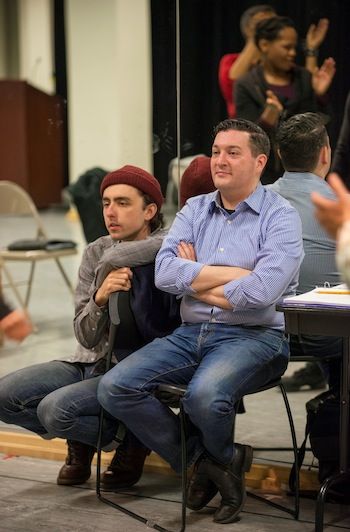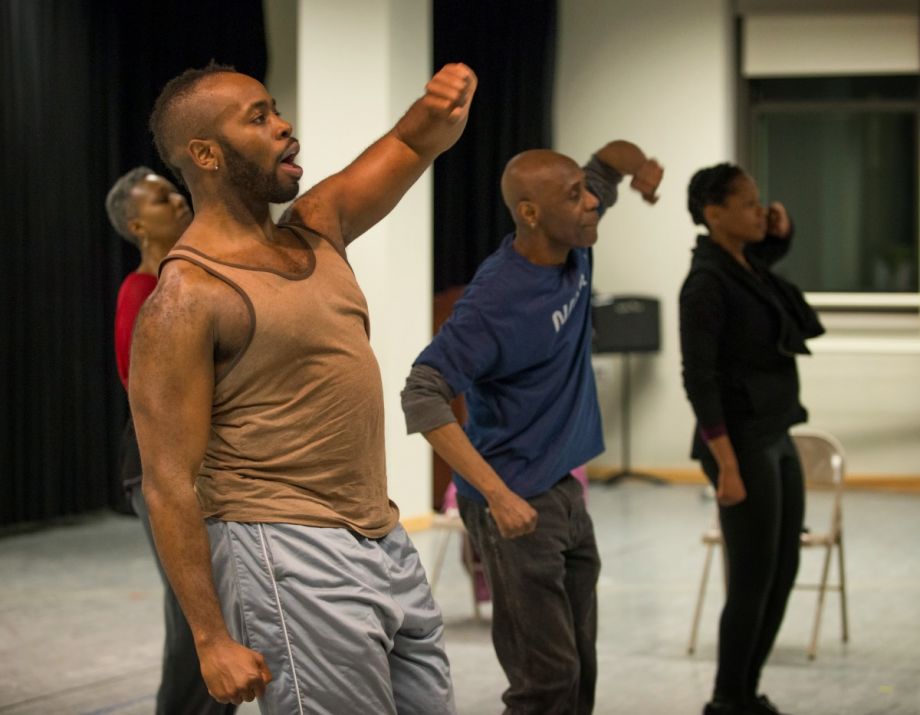Playwright P.J. Paparelli spent five years visiting Chicago’s South Side and West Side neighborhoods to interview 100-plus current and former public housing residents. He asked them how the large-scale razing of public housing affected them and their tight-knit communities. He listened as they spoke about families uprooted and scattered.
From 6,000 pages of interview transcription, Paparelli and co-writer Joshua Jaeger then scripted “The Project(s),” which debuts tomorrow tonight at the American Theater Company, where Paparelli is artistic director. The voices of those he interviewed are quoted verbatim throughout the work. Amid the dialogue, eight actors weave in gospel and punctuate lines with stepping, a percussive dance in which the body is used to create sound.
Hoping to connect to the city’s National Public Housing Museum, the Chicago Community Trust asked Paparelli to pen a play for his documentary theater focusing on what life was like in the high-rises and townhouses that were home to tens of thousands of Chicagoans.
“There are so many misconceptions surrounding the poor and what they are doing and not doing,” Paparelli says, “that we have tried to break those misconceptions.” (The Pennsylvania native’s award-winning “Columbinus” focused on issues of alienation, hostility and social pressures behind the 1999 shootings at a Littleton, Colorado high school.)
Historians and community leaders helped the playwright to meet former residents of now mostly demolished public housing complexes such as Robert Taylor Homes, Cabrini-Green and Ida B. Wells Homes. He also spoke to officers who were once part of the Chicago Housing Authority Police Department.

“The Project(s)” playwrights P.J. Paparelli and Joshua Jaeger
Noting that the research took him to neighborhoods, such as Bronzeville, he had never before visited, Paparelli says his own misconceptions were challenged and changed.
“It’s a wonderful place. The tough places aren’t the entire South Side. I have been in Chicago for seven years, and I had never been to this area because of some coo-cooness that it’s unsafe,” Paparelli explains. “If we can break some of that down, the ridiculous fears … ,” he says of his hopes for the production.
The play’s set is a large imposing wall with windows angled toward the audience, reminiscent of the architecture of the Robert Taylor Homes. It’s centered in an “alley” of long mesh fences on either side, on top of an asphalt floor. The wall acts as a surface for a complex series of images and video that relate to the story.
“We want the audience to experience the extremes of pain and celebration that was lived in these places,” Paparelli says, “and if the audience can feel that roller coaster ride, we did it right.”
Among the resident’s stories, several greatly touched Paparelli.
The involvement of children in drug-selling for gangs comes up in a scene in which a police officer recalls gang problems, while a gang member explains that kids had to maintain good grades if they expected to sell.
The play also tells the story of two Wentworth Gardens residents, Beatrice Harris and the late Hallie Amey, who saved the housing project from demolition several times. In the late 1980s, they organized the Wentworth Gardens United for Survival group during the construction of the new ballpark for the Chicago White Sox, and held public protests. They saved half of Wentworth Gardens. Amey passed away during Paparelli’s research.
The playwright himself has come away from the project with some opinions about urban planning. For example, he asks of the Robert Taylor Homes, where 28,000 people lived — 19,000 of them children — “Where were the kids able to play?” (A new book about public housing myths points to the imbalance between kids and adults as a contributing factor to problems at Robert Taylor.)
At each show, Paparelli and the cast will lead a discussion with audience members about race and public housing.
Paparelli and Jaeger hope that “The Project(s)” will eventually hit stages in Atlanta, Boston and Washington, D.C., with smaller casts performing “unplugged” versions in neighborhood community centers.
During the rehearsal process, many of the people Paparelli interviewed have met the actors who are playing them on stage. Hearing their own stories given a voice in such a public way, Paparelli says, has given them a confidence in the fact that their life, indeed, matters. “When they met some of the actors, some people tried to wrap their head around the thought that their words were in a play,” he says.
The play runs through May 24th.
Lori Rotenberk is an award-winning journalist based in Chicago. Her work appears on Grist and Civil Eats. She’s written for the Boston Globe and the New York Times and was a staff reporter at the Chicago Sun-Times.















